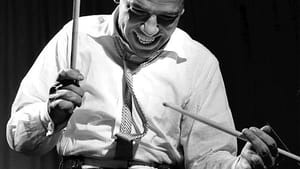Stay in the Loop
BSR publishes on a weekly schedule, with an email newsletter every Wednesday and Thursday morning. There’s no paywall, and subscribing is always free.
The "world's greatest drummer" hits 100
Remembering Buddy Rich on his centenary birthday

The January 2017 issue of Downbeat magazine, that venerable journal of jazz that has been published continuously since 1934, pays tribute to four jazz legends who would have been 100 years old next year: pianist Thelonious Monk, trumpeter John Birks “Dizzy” Gillespie, vocalist Ella Fitzgerald, and “the world’s greatest drummer,” Buddy Rich.
The inclusion of Rich is both interesting and appropriate. Though never an innovator like the other Downbeat honorees, something Rich himself admitted, he nonetheless had a remarkable career. As writer John McDonough in his essay on the fiery drummer and bandleader details, Rich’s seven-decade career began in the vaudeville era, and progressed to swing, bop, fusion, and rock. There is not a legend of jazz he did not play or record with, including fellow Downbeat honorees Ella, Diz and Monk. Buddy Rich’s “innovations” were versatility and an ability to evolve, a rarity in jazz.
Beyond swing
Sure, there were and are other great drummers, but several things set him apart. If Superman decided to play the drums, he still could not surpass what Rich could play on a drum set. His technique has never been equaled or surpassed, and it likely never will be.
As an accompanist — and he accompanied everyone from Louis Armstrong to Art Tatum — the man was an unparalleled inspiration. His feel went way beyond swing. With Buddy behind a soloist (members of his latter-day bands would be happy to corroborate this), a player could not help but play way over his or her head.
His controversial 1966 decision to form his own big band came during a time it was thought big bands were virtually dead. However, he helped inspire renewed interest in big bands, paving the way for the increased popularity of Basie, Ellington and Kenton, and new ensembles like the Thad Jones/Mel Lewis Jazz Orchestra, and the comeback of Maynard Ferguson.
Finally, as writer McDonough points out, “Thirty years after his death, Buddy Rich remains the most famous drummer in jazz history. People who know nothing about the music know that the words ‘Buddy Rich’ and ‘drums’ have become synonymous.”
A continuing legacy
Credit for Rich’s continued popularity should go to talk show host Johnny Carson, who helped establish Rich as a tart-tongued “personality” like Don Rickles, a persona that made jazz lovers out of folks who might not otherwise have been interested in the music. And Buddy’s daughter, Cathy, has worked tirelessly to perpetuate her father’s legacy with the continuation of the Buddy Rich band, with Greg Potter at the drums, B.R. Memorial Scholarship Concerts, reissues, newly discovered audios and videos, and more.
Buddy Rich had close ties to our area. His personal physician, Henry “Stuffy” Stoffman, lived here, and Buddy was a regular at every club in the region, including The Latin Casino, Brandi’s Wharf, Sciolla’s, and all the rest. He was actually considering moving here in the late 1970s. I’m embarrassed to say that I thought Philadelphia would be too dull for him and talked him out of it. (Plus, where would he park his new Jaguar?)
Some seasons ago, I had the privilege of being pegged to co-produce and write the only “official” video documentary, along with Buddy’s daughter Cathy and widow Marie, about Buddy’s life and music, Buddy Rich: Jazz Legend. Like many drummers of my generation, I’m not ashamed to say Rich was my idol, so the production of this project was quite an emotional experience. I took Cathy aside at one point and asked her father what he would have thought of a project like this. “He would have loved it,” she said. I hope so.
Sign up for our newsletter
All of the week's new articles, all in one place. Sign up for the free weekly BSR newsletters, and don't miss a conversation.

 Bruce Klauber
Bruce Klauber